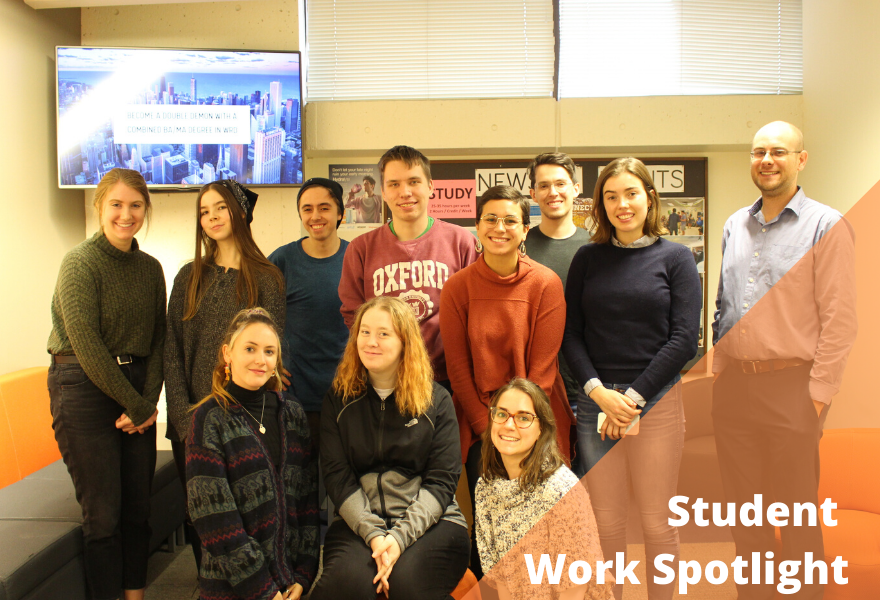As the Autumn Quarter comes to a close, students in WRD 301: Writing in Workplace Contexts shared their findings from observations and interviews of various workplace contexts. Taught by WRD Assistant Professor Tim Elliott, this course enables students to “examine the roles of writing… in professional contexts and learn common features of workplace writing situations… and strategies for responding to them.”
The report [students] presented on focused on “synthesizing [students’] observations from your independent, site-based research into an original insight about how writing functions at the site your selected and connect that insight to larger understanding of workplace writing scholarship.” I asked students to “call upon research from the class, when relevant, as well as your observation, document analysis, and interview data.”
Tim Elliott
The workplaces observed ranged from super markets to hospitals to a variety of other companies and nonprofits and a brief summary of their research and presentations can be found below.
Isabel Cueto studied communication in the Tutorium in Intensive English program at the University of Illinois at Chicago. Her main findings included, “A rise in the asynchronous communicative capacity of text messaging in collaboration in teaching and collaborating. Instructors are turning to text messaging as a digital form of quick and efficient collaborative writing” (Cueto).
Ben Dojutrek observed a local Chicago PR firm which guided his presentation of common genres within this field. Ben shared his findings on multiple genres that work together in this workplace, such as pitches, boilerplates, press releases, and social media posts.
Megan Giese observed the work of a Marketing Communications Specialist at Lurie Children’s Hospital of Chicago. Megan’s presentation emphasized the importance of collaborative writing and community when writing in a hospital setting.
Savannah Geer’s research was conducted at Northwestern University Press where learned more about how the organization communicates both internally and externally. In particular, she highlighted the importance of the Press’s email, their tone and templating, and consistency across communication.
Patricia Haney interviewed Writing Center (UCWbL) Coordinator Katie Brown and WRD Associate Professor Julie Bokser to conduct document analysis of department and personalized course descriptions. Her observations of DePaul’s Writing, Rhetoric, and Discourse Department highlighted how personalized and documented pedagogies can support student learning.
Alex Jackson shared his research on Jackbox Games, a video game developer based in Chicago, IL, known for their “Jackbox Party Games” such as Quiplash or Fibbage. Participating in a usability test for a new game during his observation and site visit, Alex learned and discussed his findings for how this company adheres to and breaks traditional conventions of workplace writing.
Weronika Koleda observed a 2-hour painting class, analyzed workplace documents, and interviewed a painting instructor at Pinot’s Palette, a paint and sip studio with a location in Glenview, IL. Her presentation discussed the identity of the company, how their documentation helps to create and support this identity, and
Jonas Lambert observed his own workplace of Whole Foods where he works as a dishwasher. Looking primarily at their internal and external communication, he argued that in attending to those two audiences differently, they are able to build rapport, loyalty, and respect.
Adriana Yochelson focused her research and observations on the workplace writing at Search Inc. Search Inc. is a community-based nonprofit that provides “services and supports for individuals with intellectual and developmental disabilities.” Her presentation covered this nonprofit’s dedication to writing that is accessible, inclusive, and that cultivates a mindfulness.
Megan Youngerman’s research focused on the Chicago Rowing Foundation (CRF), where she looked for patterns across formal writing practices and informal writing practices. Paying particular attention to the community’s use of TeamSnap, a platform designed for organizing teams sports. Interviewing Hannah Marquis, teaching assistant at DePaul University and Rowing Coach for CRF, Megan found that, “Being able to instantly communicate with athletes and each other is a necessity” (Marquis).
